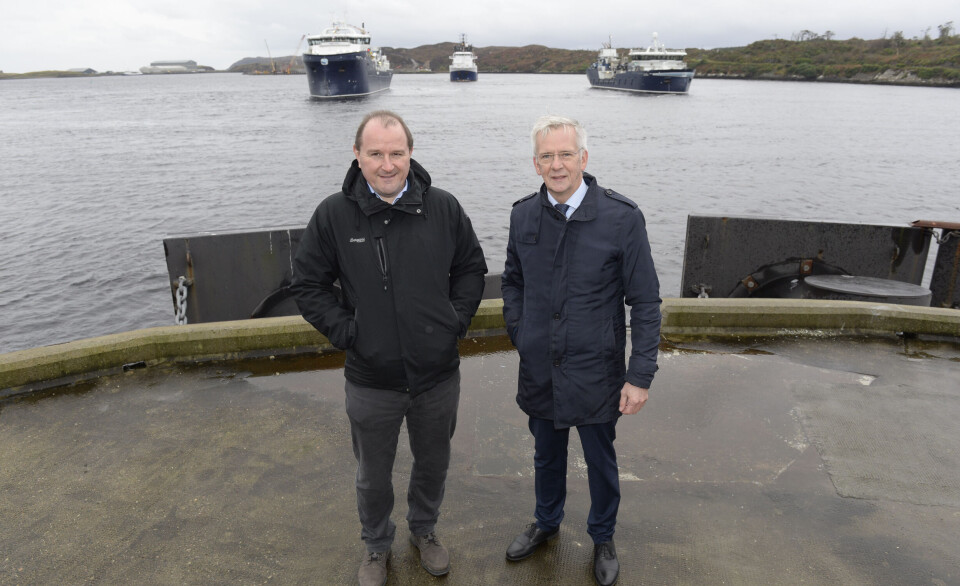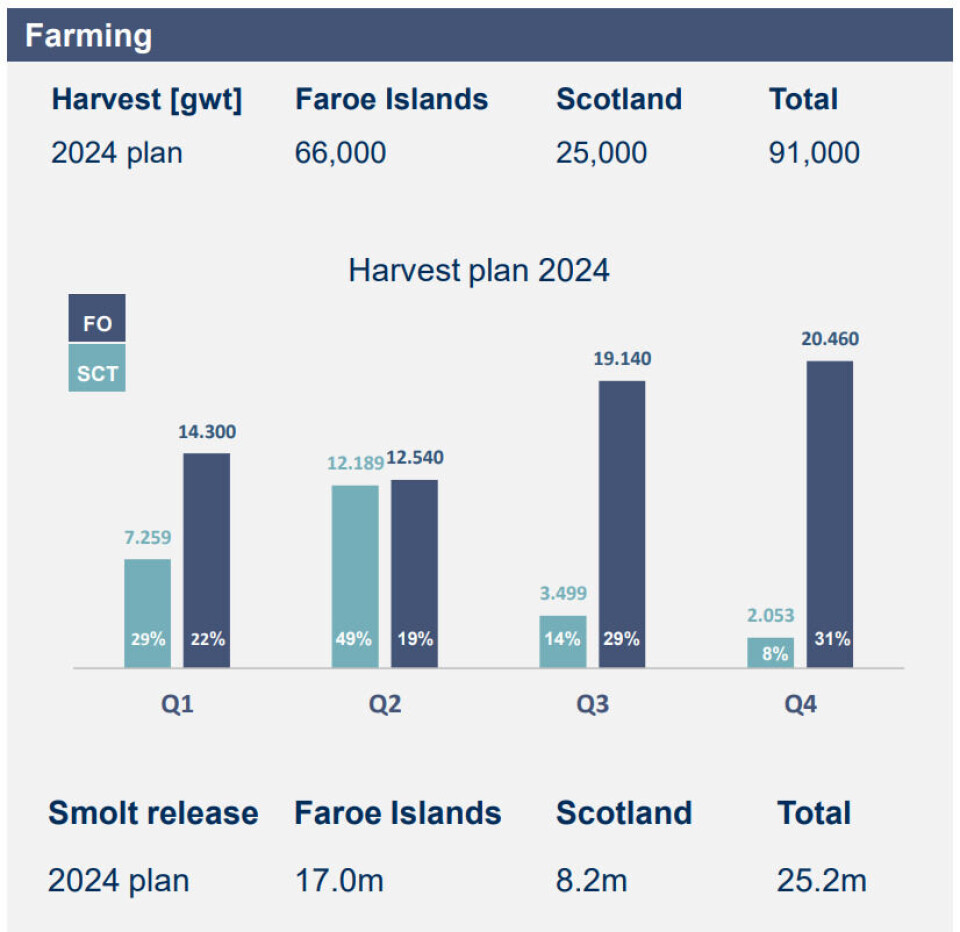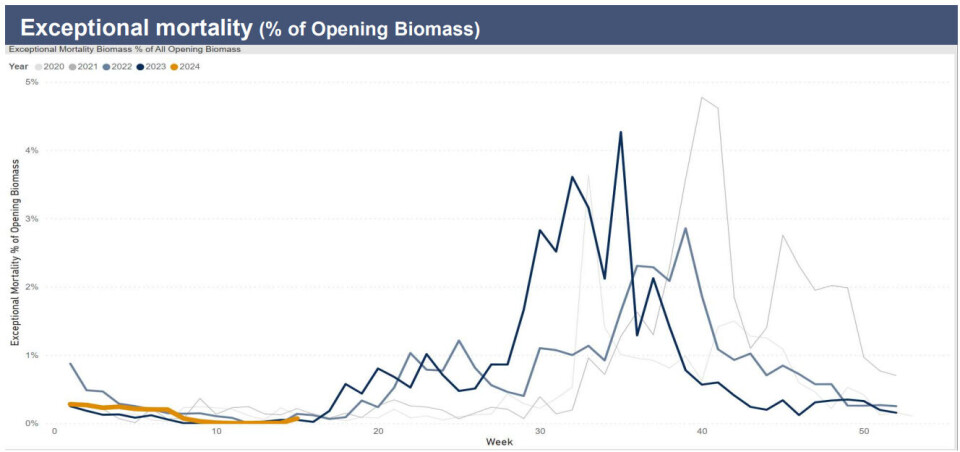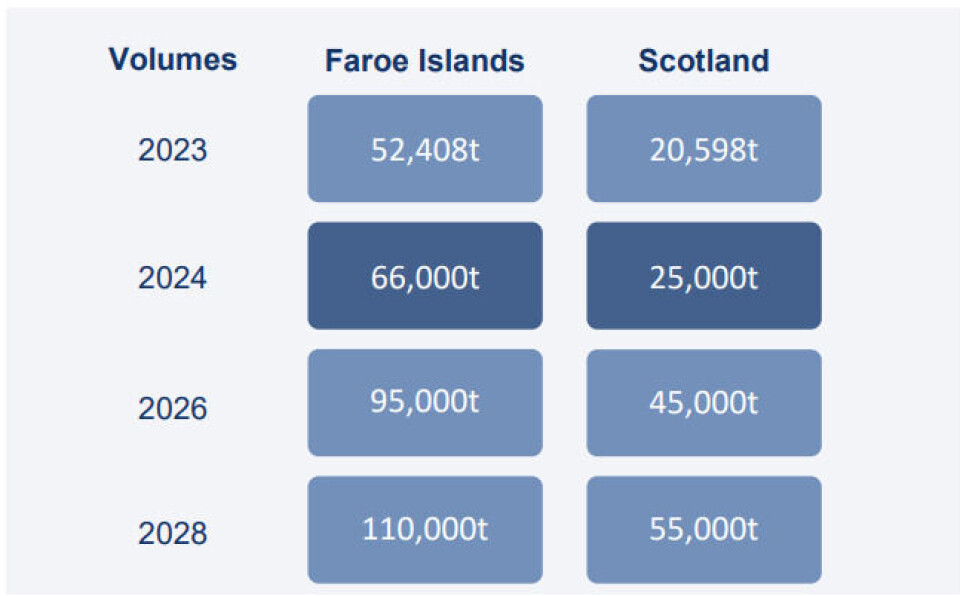
Mixed results for Bakkafrost in Q1
Start-up issues slow production at large-smolt facility in Scotland but marine biology is good
Faroes and Scotland salmon farmer Bakkafrost’s plan to increase the size of smolts stocked in its Scottish marine sites has been slowed due to start-up issues in part of its Applecross facility that has not yet been commissioned, it said today.
“This impacts the ramp-up pace of the overall smolt release this year and the average weight which is now expected to reach 200g in Q4,” said chief executive Regin Jacobsen in a comment on the company’s results for the first quarter of 2024.
Bakkafrost made an operating profit of DKK 710 million (£81.5m) in Q1 2024, up from DKK 565m in the same period last year. Total profit was DKK 401m, down from DKK 467m in Q1 2023.
Improved biology
“We are satisfied with our strong results in the first quarter 2024 – especially in the Faroe Islands,” said Jacobsen. “Good biological performance in the Faroe Islands and improved biology in Scotland has enabled us to harvest large fish of superior quality and benefit from a salmon market marked with low availability superior quality and large fish. In Scotland the biology has been good at most sites, except for one site with fish previously weakened by a jellyfish encounter.”
The total combined harvest in Q1 in the Faroe Islands and Scotland was 21,557 gutted weight tonnes, almost 2,500 gwt more than the 19,098 gwt harvested in Q1 last year due to a larger harvest of 14,294 gwt (11,005 gwt) in the Faroes.
The harvest of 7,263 gwt in Scotland was lower than the 8,093 gwt harvested in Q1 2023 but keeps the Scottish operation on course for a full-year volume of 25,000 gwt, nearly half of which will be harvested in the current quarter.

Bakkafrost’s freshwater and marine farming operations are now separated under the company’s accounting procedures, and Scotland’s freshwater segment made an operating loss of DKK -178.98 per kilo of released smolt (Q1 2023: DKK 75.43 per kg), partly due to incident-based costs of DKK 14m (£1.6m).
The Scottish farming segment made an operating profit of 3.35 DKK per kilo, down from DKK 15.14 per kilo in Q1 2023. It had incident-based costs of DKK 18m and accrued costs on DKK 13m relating to recovery of a feed barge that sank in 2023.
In the Faroes, where Bakkafrost’s large smolt policy is
several years ahead of Bakkafrost Scotland, the farming segment made an operating
profit per kilo of DKK 33.03, almost ten times that of Scotland.
But the company if confident results in Scotland will improve as it produces and stocks larger smolts of up to 500 grams, reducing time the fish spend exposed to environmental challenges at sea. Bakkafrost Scotland has also seen good results from increased investment in freshwater treatment of its fish to tackle gill disease and sea lice and has chosen to harvest three-quarters of its fish in the first half of the year, to avoid the increased biological problems associated with late summer.

“Preparations to execute the strategy were made in Q4 2023 during which Bakkafrost built up biomass and increased the size of fish in the water by improved biological control minimising harvest volumes,” wrote the company in its Q1 2024 report.
“Consequently in Q1 2024, the biological performance in Scotland has been good, harvest volumes increased significantly and average harvest weights as well. Like in the Faroes, sea lice levels are all-time low and the superior rates high, leading to good price achievement.
“In Q2 2024, Bakkafrost continues to follow the de-risking strategy, targeting a lower biomass at risk for Q3. Consequently, Bakkfrost expects harvest weights to reduce in the second half of Q3, as some sites might be harvested out earlier than normal and ahead of Q3.”
Fewer external smolts
Bakkafrost said its de-risking strategy for the Scottish operation also covers the freshwater operation.
“In order to address the biological risks, Bakkafrost made strategic adjustments to its short-term production plans and conducted a comprehensive risk assessment for all farming sites, including evaluating the feasibility of stocking and farming these sites using various strains, hatcheries, and smolt sizes,” it said in its report.
“Based on this evaluation, Bakkafrost will prioritise and advance the utilisation of large, high-quality smolt from the Applecross hatchery over external sources. Consequently, Applecross will supply nearly all of the required smolt to the marine sites in 2024, focusing on delivering a well-controlled increase of the production of large high-quality smolt. Only by exception will smolts be sourced externally, if the size and quality of the smolt is sufficiently high.”
All smolts for Scotland
Applecross is expected to supply around 8 million smolts this year. The average weight is expected to increase during the year reaching 200g on average for Q4 2024. The average weight for the full year 2024 is expected to be around 165g.
Along with the expansion which had start-up issues, two further expansions are due to be completed at Applecross by the end of this year.
“Applecross will [then] be able to produce all smolts for Scotland at around 200-300g. As shown in the Faroe Islands, big and healthy smolt will face lower risks in the marine environment because of shorter production cycles in the sea and more robust salmon. In Q1 2024, the average weight of released smolt in Scotland was 121g, which is 9% higher than in Q1 2023,” wrote Bakkafrost.
When complete, Applecross will have the capacity to produce 7m smolts at 500g annually, and Bakkafrost plans a second Scottish large smolt facility at Farlie in Ayrshire which will produce 8m smolts at 500g to meet demand for expanded production (see below). Bakkafrost also plans a new Scottish processing plant as part of its DKK 6.3 billion investment plan for 2024-2028.
























































